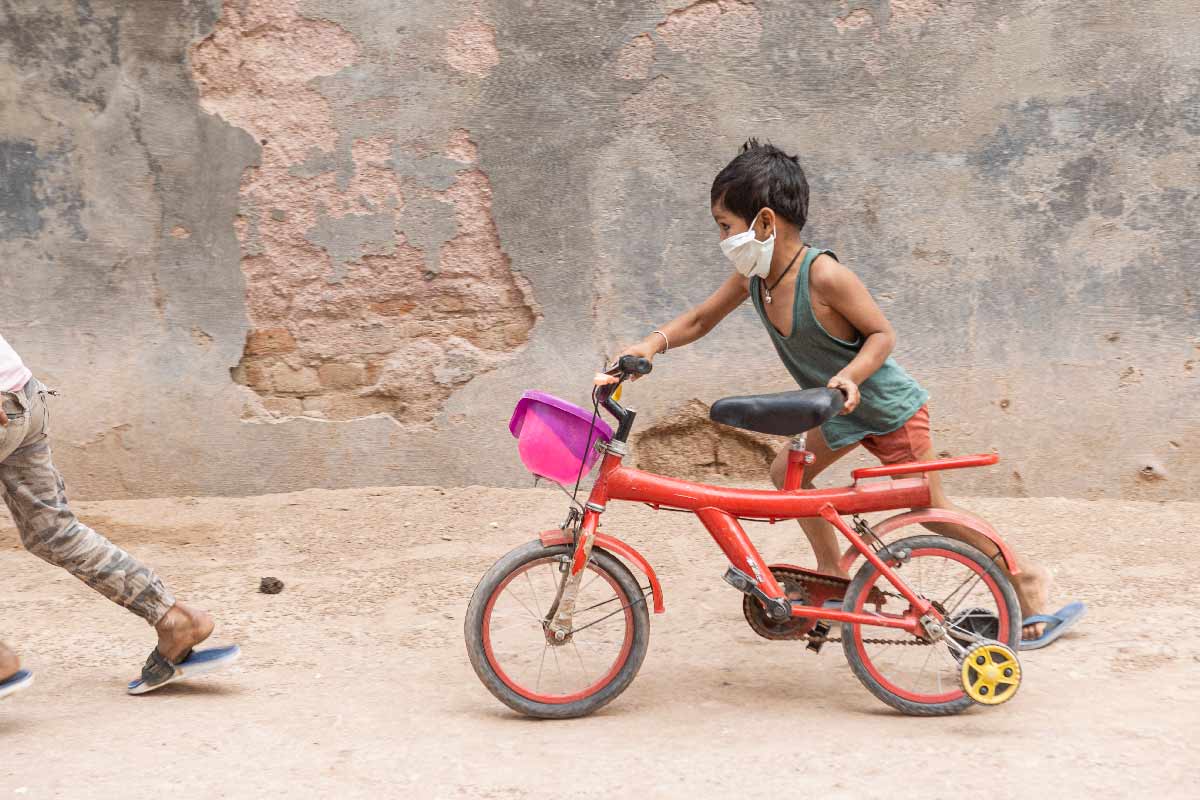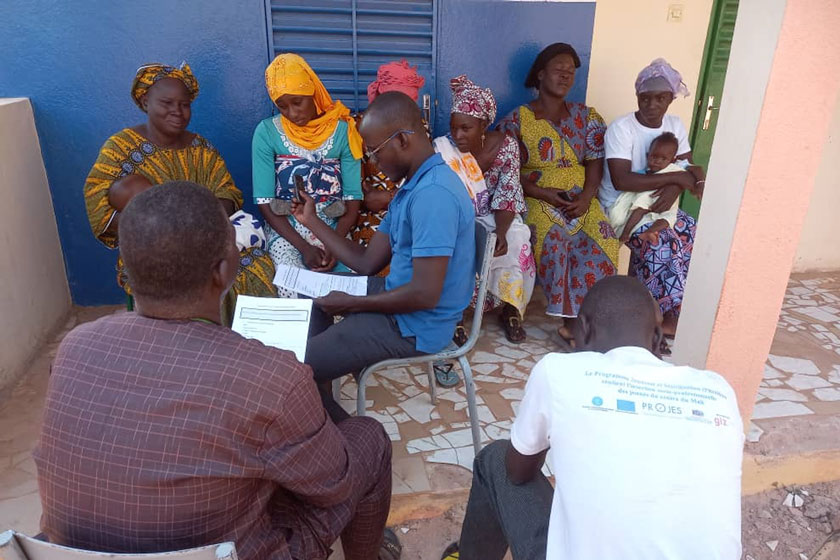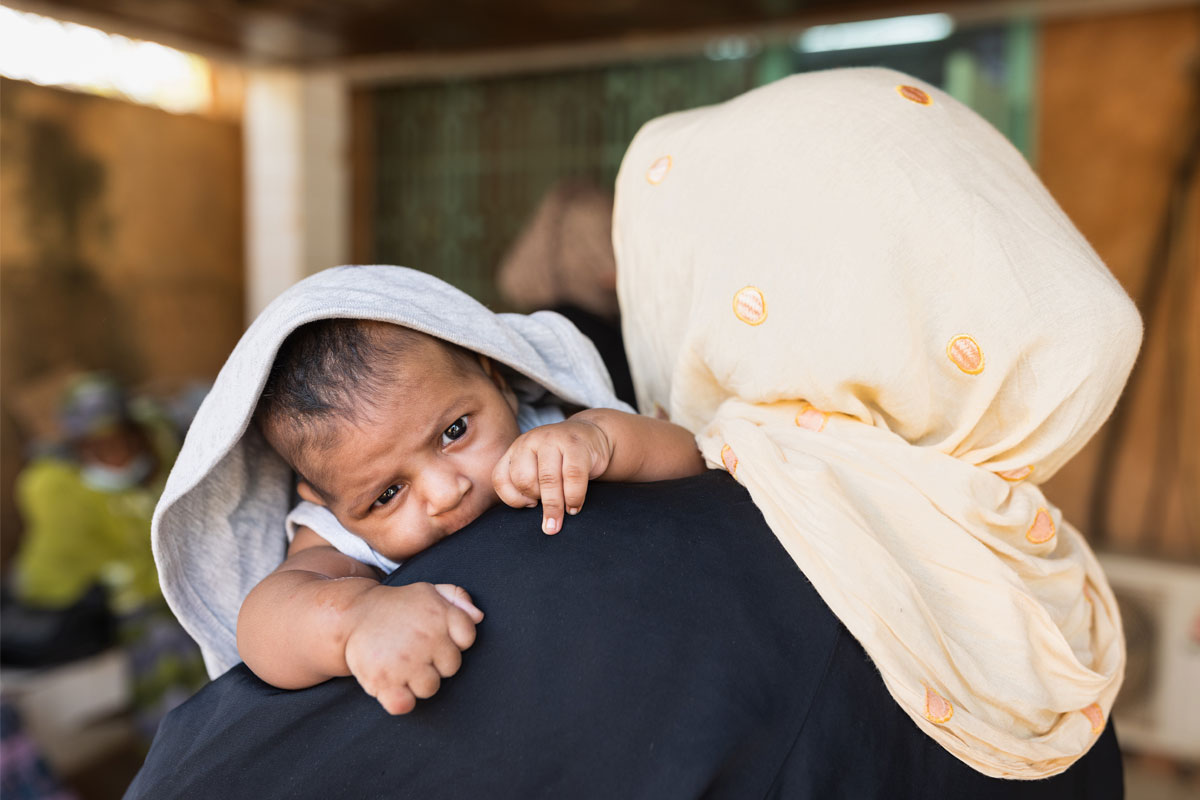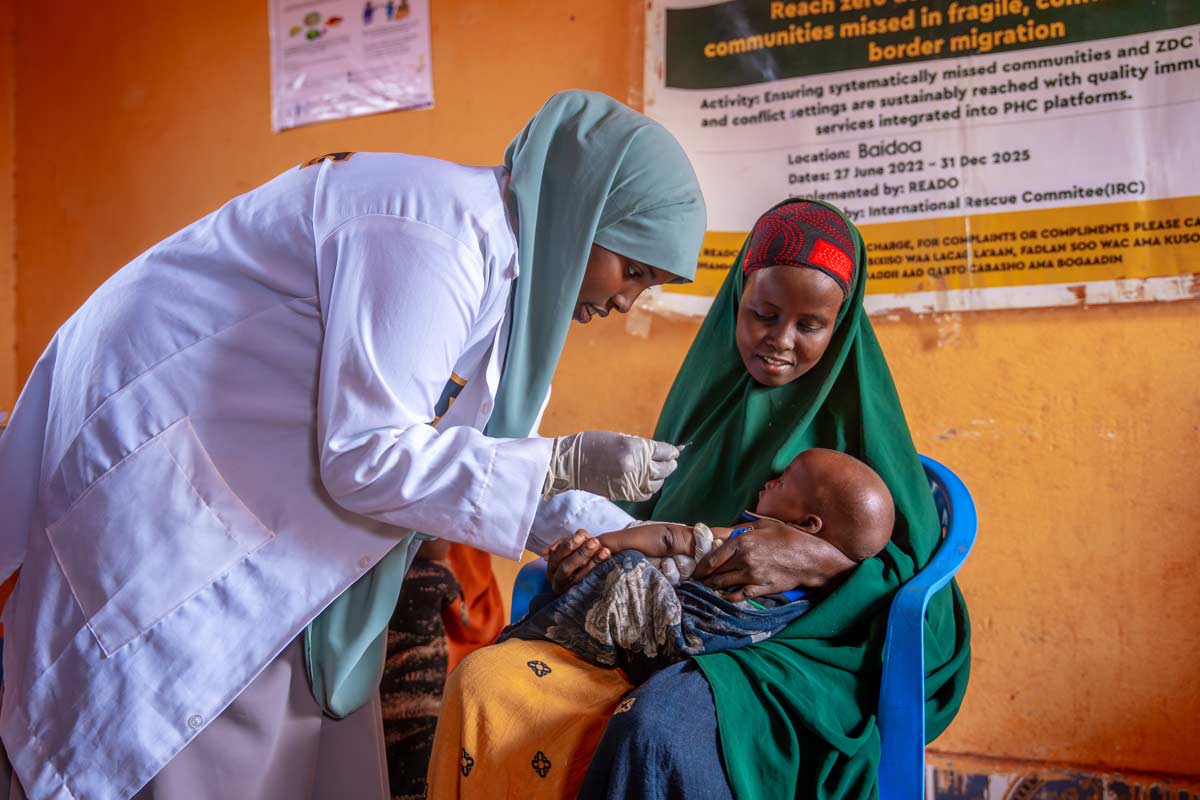From sceptic to advocate: a father’s role in transforming childhood immunisation in Ghana
Whose job is keeping the kids healthy? A health and gender project in the west African country rattles social norms, bringing more dads out to clinics.
- 15 November 2024
- 6 min read
- by JSI
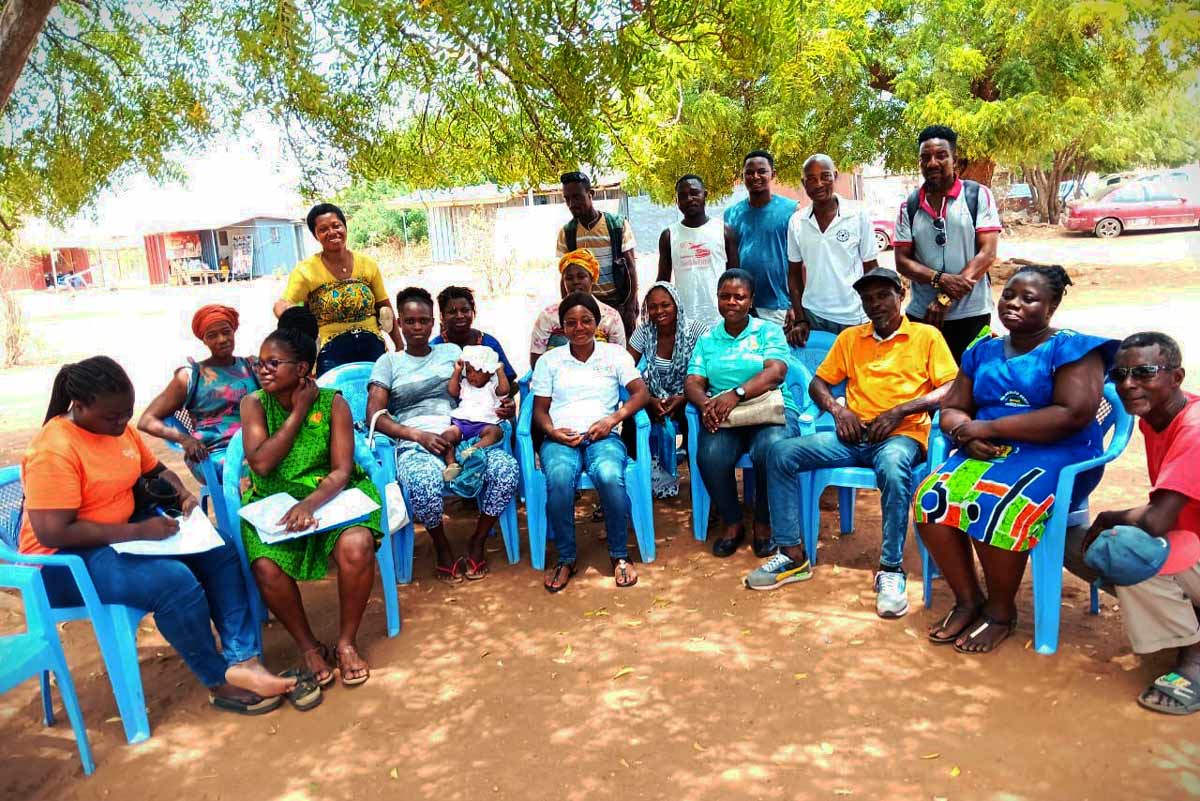
For years, Samuel Buabeng, a welder and father of two in Ghana’s Kpone Katamanso municipality, believed immunisation was solely a mother’s duty. Like many men in his community, he never considered taking an active role in his children’s health care. However, as gender norms within his community began to shift, Samuel joined a profound transformation—challenging long-standing beliefs about men’s involvement in child health care.
“When my daughter was younger, I never went with my wife for her vaccinations because I thought mothers were responsible for that,” Samuel recalls. “But now I understand how important it is, and that fathers also play a crucial role in ensuring their children get all their vaccinations.”
Buabeng’s decision to become more involved wasn’t easy. He faced scepticism, even from his own family. “My mother said I was being controlled by my wife when I told her I was taking our son to the clinic for vaccination,” he shares.
But Buabeng was determined to break the cycle. Through a gender-based intervention funded through a cooperative agreement between the Task Force for Global Health and US Centers for Disease Control and Prevention (CDC), and implemented by JSI Research & Training Institute, Inc. (JSI) in collaboration with the Ghana Health Service (GHS), Buabeng attended community education sessions led by local nurses. Now, he advocates for fatherly involvement. “When people see me going to the clinic with my children and wife, they praise me,” he says with pride.
His son Henry, just two years old, has benefitted from Buabeng’s newfound commitment, but he expresses regret over his earlier lack of involvement with his daughter, Lordina, now 11. “I’ll continue to be involved, and I tell other fathers they should be too,” he affirms.
“We’ve engaged parents on every platform – markets, opinion leaders, churches and mosques – because shifting the perception that health care is solely a woman’s duty requires ongoing, community-wide education.”
- Dr Esther Dankwa, director of health services for Kpone Katamanso municipality
Kpone Katamanso, with its diverse urban, semi-urban and rural populations, has long faced challenges in immunisation coverage due to gender barriers. Many women shoulder the primary responsibility of ensuring their children are vaccinated, but they face several obstacles, such as taking time off work, finding help with childcare or household chores, and covering transportation costs to the health facility. However, the JSI-led gender-based initiative is transforming this landscape by encouraging both parents to engage in childhood immunisation.
For Esther Matey, Buabeng’s wife, this shift has been liberating: “I feel so happy when he [Buabeng] comes with me,” she shares. “Before, it was always my responsibility. Now, he helps track the dates and ensures we have transportation. I don’t have to do it alone anymore.”
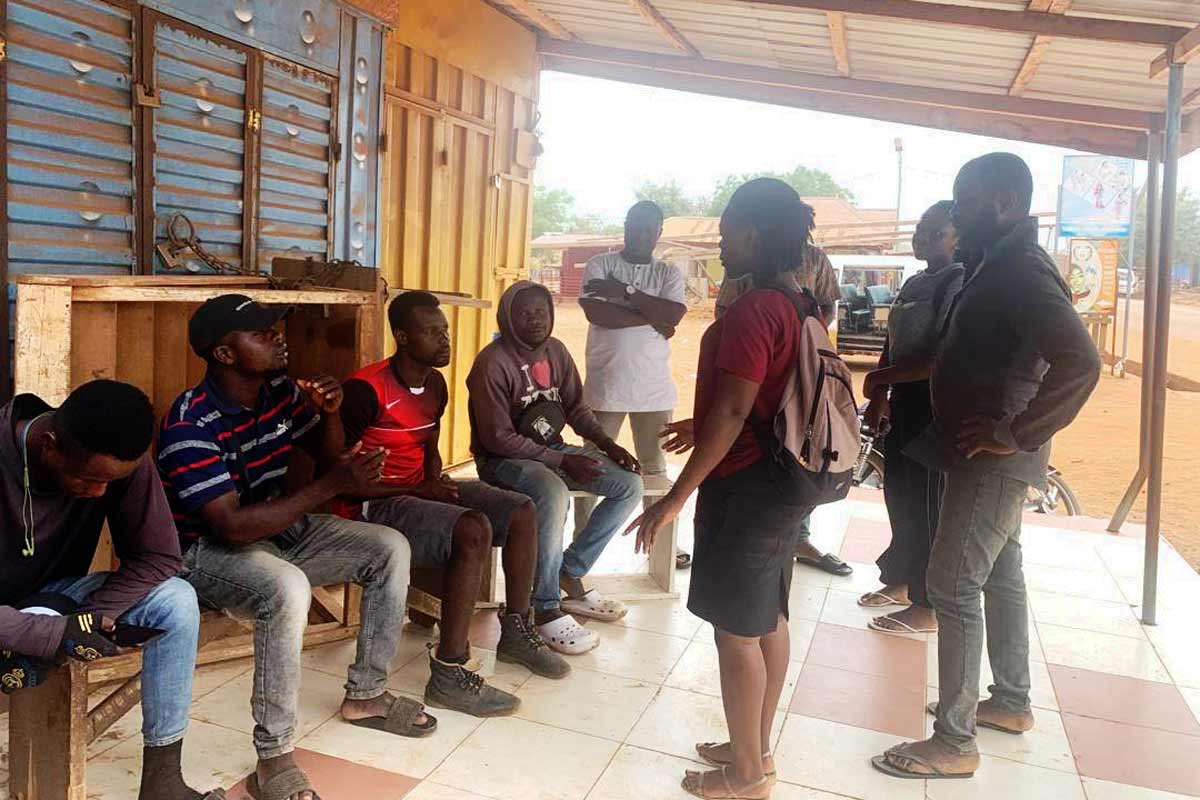
Building on this progress, the initiative aims to challenge entrenched norms by promoting awareness and encouraging fathers to take part in health care decisions. Dr Esther Dankwa, director of health services for Kpone Katamanso municipality, emphasises continuous education:
“We’ve engaged parents on every platform – markets, opinion leaders, churches and mosques – because shifting the perception that health care is solely a woman’s duty requires ongoing, community-wide education.” This effort seeks to create a more inclusive approach to child health care that empowers both mothers and fathers.
The evolving dynamic reflects a broader shift in the district, where male participation in immunisation has historically been low. A survey administered among a sample of caregivers in Kpone Katamanso before the intervention revealed that 41% of men surveyed did not believe fathers had a role in vaccinating their children. “It’s not easy for everyone to understand that fathers must be involved,” Buabeng acknowledges.
“But the education from the nurses showed me how important it is.”
Dr Dankwa highlights this positive change, “There has been a remarkable increase in family involvement, especially male involvement. Fathers are gaining more knowledge about immunisation and now bring their children without hesitation.” In this context, male involvement encompasses not only attending appointments but also providing other critical forms of social support, such as helping with transportation, arranging childcare and ensuring the entire family is informed about the benefits of immunisation.
The results are clear. From mid-2023 to mid-2024, the number of fathers attending child welfare clinics in the Apollonia Community-based Health Planning and Services (CHPS) zone surged from 18 to 117. Similar progress was made in the Shanghai and Switzerland CHPS zones, where male attendance increased from 26 to 177 and from 43 to 183, respectively.
“I’m making sure Henry gets all his vaccinations, and I’m working hard to encourage more men to get involved. We all need to step up for our children’s health.”
- Samuel Buabeng, father, Kpone Katamanso
Buabeng has become a powerful advocate for this change. “I talk to other fathers about vaccination, asking their opinions and sharing my own experiences,” he says. “I use every chance I get to explain how important it has been for my family, and now I see other men, including some of my friends, getting involved.”
Health workers are witnessing this shift as well. Louisa Nyarko, a health worker at Apollonia CHPS, notes, “Traditionally, mothers handled immunisations while fathers focused on providing for the family. However, the JSI-led gender-based intervention has encouraged more fathers to attend vaccination services and support their partners. This increased involvement has strengthened relationships between caregivers and health workers, enhancing communication through phone calls and community WhatsApp groups to ensure no child is left behind.”
The initiative’s approach includes training health care workers to engage better with caregivers, forming quality improvement teams of local community members to act as ambassadors, and hosting monthly community conversations to build trust and address concerns. “It’s inspiring to see more men showing up at the clinics,” says Gladys Daamaah, a mother from the Apollonia community. “It gives us strength, knowing we’re not alone in this.”
Have you read?
Local assembly member Hon. Dennis Tetteh recognises the shift in community attitudes: “The increase in fathers’ involvement is encouraging. We’re building a community where both mothers and fathers share the responsibility of immunisation. It’s essential for the well-being of our future generations.”
As Kpone Katamanso continues to tackle the barriers to immunization coverage, families like Buabeng and Matey’s are at the forefront of this transformation. Buabeng’s commitment to ensuring his son Henry receives every vaccine reflects this shift. “I’m making sure Henry gets all his vaccinations,” he says. “And I’m working hard to encourage more men to get involved. We all need to step up for our children’s health.” These local efforts are part of a broader initiative to improve immunisation rates across the district. “We’ll continue to integrate gender-sensitive approaches in immunisation programmes,” Dr Dankwa affirms, emphasising that sustainability depends on strong community relationships and health worker support.
This evidence, generated from a small-scale intervention, underscores the potential impact of enhanced family and male involvement. Expanding these approaches to other settings and evaluating them further will be critical to understanding how changes in family engagement and fathers’ support might improve childhood immunisation uptake. The combined efforts of JSI, GHS and dedicated families are ensuring that every child receives life-saving vaccines, building a foundation for stronger, healthier communities that will thrive for generations to come.
Written by Richard Adupong, JSI
